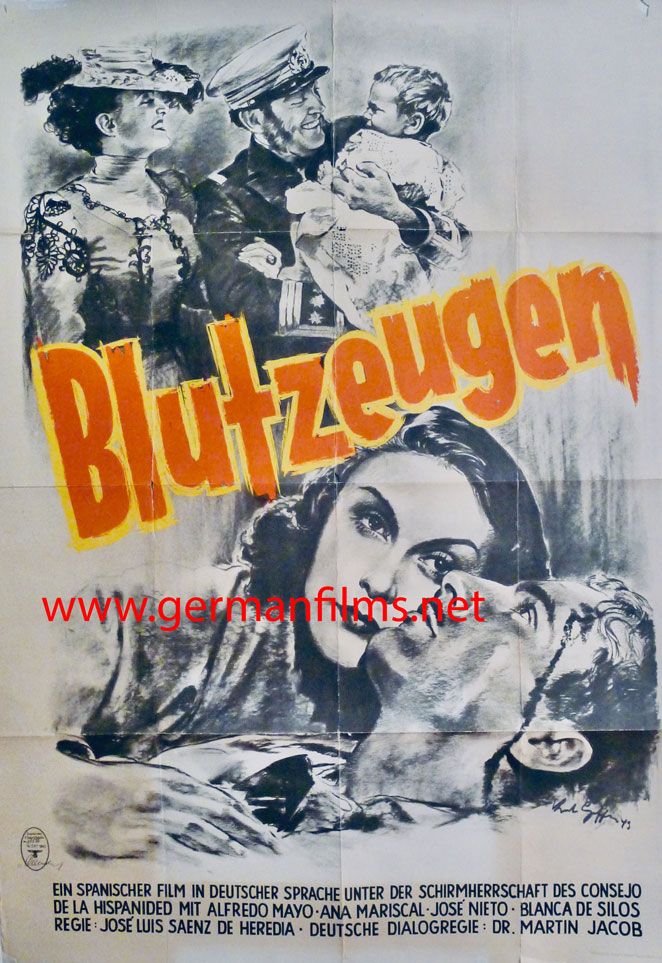- Home
- POSTER GALLERY
- ❗️BOOK & POSTER STORE❗️
- PURCHASE "HJ Quex" film ephemera HQ
- About the Posters
- The William Gillespie Collection
- Our Publishing House
- ❗️GFDN interviews author and collector William Gillespie ❗️
- Our most expensive & inexpensive finds!
- ❗️***NEW!**❗️POSTER OF THE MONTH - Blutzeugen / Raza
- ❗️NEW ❗️Film Posters – Demands on an important means of film advertising. ❗️
- In our Book + Zeitschrift Library
- ❗️ ***NEW!*** Hitler Youth Quex – A Guide for the English–speaking Reader ***NEW!*** ❗️
- ❗️***NEW!*** Table of Contents of our new HJ QUEX book❗️
- ❗️Hitler Youth Quex Guide - early praise! ❗️
- Recent loans from the Collection
- Farewell Horst Claus. (1940–2024 †)
- "Der Deutsche Film" Zeitschrift
- ❗️ ***NEW!***Reichsfilmkammer collection ❗️
- German "Tendency" Films (Tendenzfilme) in the Third Reich
- KARL RITTER
- Karl Ritter original film posers in this Collection
- "Besatzung Dora" ( † 1943)
- "The Making of The Crew of the Dora"
- Karl Ritter at the 1938 Reichsfilmkammer Congress
- INDEX -"Karl Ritter" book, 2nd edition
- Karl Ritter's Legion Condor (1939, unfinished)
- Excerpt from our "Dora" book
- ∆∆∆∆∆ High praise for our DORA book! ∆∆∆∆∆
- TABLE OF CONTENTS – "Legion Condor"
- § § § § § Early Praise for our LEGION CONDOR book! § § § § §
- ❗️"Das Leben geht weiter" and Karl Ritter ❗️
- Dateline: Ufa - April 11, 1945
- Zarah Leander Europe–wide !
- Japan Military Film and Karl Ritter
- Karl Ritter after 1945
- 1935 Film Congress
- Poster Exhibition in Berlin, March 1939
- Potsdam poster exhibition 12 April–25 August 2019
- Leni Riefenstahl's two "Olympia" Films (1938)
- "Ohm Krüger" (1941)
- Emil Jannings
- "Blutendes Deutschland" (1933)
- Hannes Stelzer ( † 1944)
- Klaus Detlef Sierck ( † 1944)
- Film stills
- Reich Film Censorship Offices
- ❗️***NEW!***The Fate of the German Film Industry in May 1945 ❗️
- Film censorship cards
- Film Archives
- Cinema advertising
- School filmstrips
- ❗️UPDATED❗️ Z F O / Ostland Film G-m-b-H
- Z F O / Herbert Jacobi estate
- ZFO / Ostland Film newspaper articles
- ❗️***NEW!*** Roter Nebel / Red Fog / Red Mist (1942/1943, ZFO) ❗️
- ZFO - Der Rückkehrer - The Returnee (1943/1944)
- The D F G production company
- D I F U
- ❗️ ***NEW!*** "Carl Peters" – Special Collection. ❗️
- "Alcazar" (1940, Genina)
- "Der 5. Juni" (1943, banned)
- Herbert Selpin and his "Titanic" (1943)
- Ein Robinson (1940, Fanck)
- "Fronttheater" (1942)
- Veit Harlan's Jud Süß and Fritz Hippler's Der Ewige Jude
- Harlan "Jud Süß" trial 1949
- Werner Krauss & JUD SÜß
- Anti-Semitic Film Posters in the Collection
- "Heimkehr" (1941)
- "Hitlerjunge Quex" (1933)
- ❗️***NEW!*** Hitlerjunge Quex in 111 Greater Berlin Cinemas ❗️
- Jürgen Ohlsen
- "S.A.Mann Brand" (1933)
- "In der roten Hölle" (Edgar Neville, 1939)
- "Helden in Spanien" (1938)
- The Spanish Civil War in Film
- Andrews Engelmann (1901 – 1992)
- Deutsche Wochenschau
- Uƒa Feldpost
- Uƒa Kulturfilm – Informationen
- " Die Tochter des Samurai" (1937, Fanck)
- Ufa 25th Anniversary
- Invitations to world premieres
- ❗️***NEW!*** Continental Films, Paris 1940–1944 ❗️
- Film Censorship in Occupied Paris 1942
- "Der Sieg des Glaubens" (1933)
- Wilhelm Althaus Estate
- Weimar Germany posters
- Ufa and the Ordensburgen
- The Gaufilmstelle in our Collection
- "Zwei Welten" (1940)
- "Capriccio" (1938) –Karl Ritter film album
- Unrealised NS Propaganda Films 1934–1945
- German Film Directors accused of "war crimes"
- Australian––themed NS feature films
- "Der Störenfried" / "The Troublemaker"
- What was new in 2014?
- What was new in 2015?
- What was new in 2016?
- What was new in 2017?
- What was new in 2018?
- What was new in 2019?
- What was new in 2020?
- What was new in 2021?
- What was new in 2022?
- What was new in 2023 ?
- What's new in 2024?
- ❗️***NEW!*** Hitler assassination attempt in Karl Ritter film cut❗️
- BESATZUNG DORA private photos
- Just discovered 1942 article on BESATZUNG DORA
- The Karl Ritter Tetralogy
- Google Analytics 2023
- Our first–ever acquisition!
- ❤️"Some of our favourite things....!"❤️
- ERRATUM for our " Hitler Youth Quex Guide"
- Trending
- Vale †
- Our Wants List / 2024 / Wunschliste
- Pop Quiz
- Unsere KARL RITTER Bücher in Deutschland liefbar!
- WHERE to buy our books right now?
- ✉️Contact
 “History is not about the facts. It is about the context and who is telling the story.” —Prof. Milton Fine.
“History is not about the facts. It is about the context and who is telling the story.” —Prof. Milton Fine.
"Who controls the past controls the future: who controls the present controls the past." –– George Orwell in his novel "1984."
"Whoever doubts the exclusive guilt of Germany for the Second World War destroys the foundation of post–war politics." –– Prof. Theodor Eschenberg, Rector, the University of Tübingen.
"If we have our own why in life, we shall get along with almost any how." – Friedrich Nietzsche
POSTER GALLERY --view
over 500 German film
original posters between
1927–1954 from
Germany and from
many Axis and Neutral countries
across Europe!
Note! Posters in the Poster Gallery are PERMANENT
acquisitions which are NOT FOR SALE!! ONLY the
posters listed in our POSTER STORE are for sale.
(They have a price and order button to use.)
RAZA / BLUTZEUGEN / MARTYRS (1942)
FRANCESCO FRANCO'S OWN FILM SCRIPT BECAME A SPANISH
CIVIL WAR PROPAGANDA FILM IN 1942.
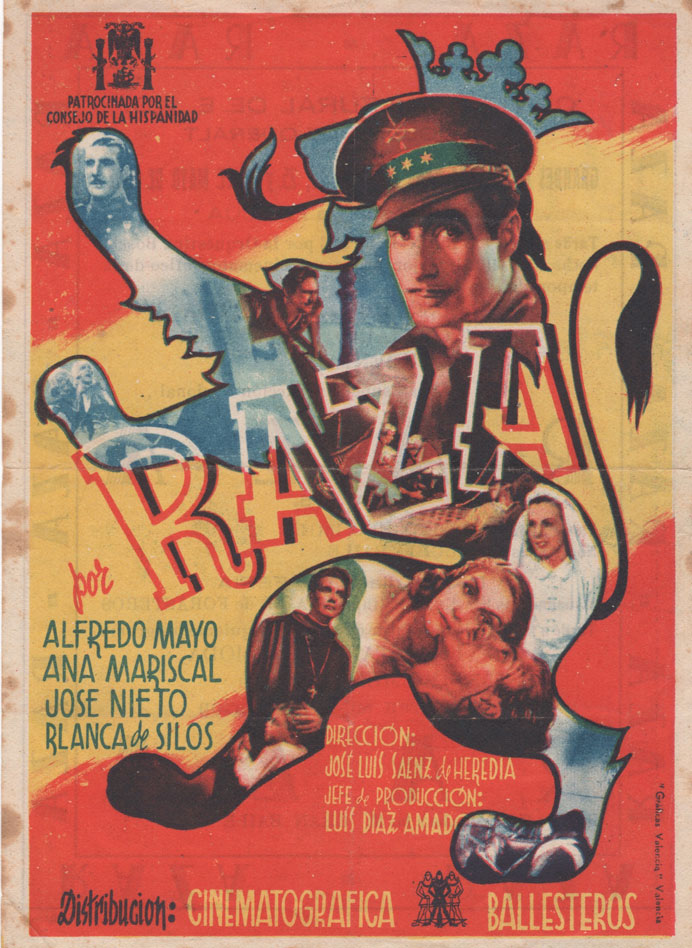
Franco wrote the film script under a nom de plume," Jaime de Andrade." The film was released in Spain in 1942. In the 1950s, when Francoist Spain was trying to accommodate the post-WWII world, about fifteen minutes of the film were removed when it was re-released. The censored version is available in Spain today as a DVD. The complete uncut version is available with English subtitles on DVD here. The DVD is the Spanish-language version, not the German dubbed version.
Despite Nazi Germany's strong support for Franco's victory against the Red "Popular Front" by sending the Luftwaffe as the Condor Legion between 1936 and 1939; this film was not synchronised in German (dubbed) until late 1943, and did not have its Third Reich premiere until late February 1944. By then, the Spanish Civil War was a distant memory for most Germans, hoping desperately for a victory against the Soviet Union approaching their own borders.
The film was titled Raza in its Spanish version. "Raza" means "race" in English but the word connotes more than that insofar as it embodies the "Spanish race" – its history, its people, its culture, its overall being.
The German title chosen for the Third Reich cinemas was "Blutzeugen" which translates literally as "blood witnesses" but a better English translation would certainly be "martyrs."
Original Raza Spanish film posters from 1942 are exceedingly rare, and the only one we have found over the years is available through a Barcelona poster dealer for €3,250. We do, however, own the "Blutzeugen" poster issued in early 1944 for the Geman premiere cinema run. We also own the cinema owners's guide (der Werberatschlag), two rare German lobby cards, and 8 Spanish press photos. Some of these are pictured below. At the bottom of this web page you will find the German poster, which is also to be found in our Poster Gallery.
The German cinema promotion guide's synopsis of the film:
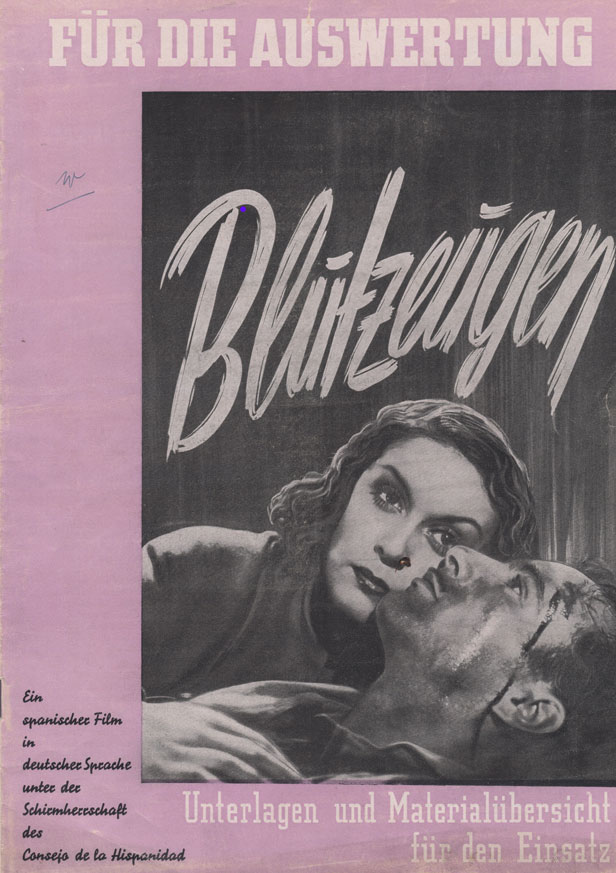
BLUTZEUGEN. Werberatschlag Synopsis translation
1897. Having happily returned to his Spanish homeland from his arduous world trip, Captain Churruca tells his sons and little daughter about the heroic deeds of their ancestors: the children's eyes are filled with a picture of a noble family that was always ready to risk its life when it came to serving the fatherland. With shining eyes, the father speaks of the great men of history and has no idea that a few weeks after these happy hours, he will be called to the ranks of the immortals in the naval battle off Cuba. 1928 - 1929 — 1930 — 1931 — nervous tension hangs over Spain, rumors and news fly from mouth to mouth ... the daily papers report in a rush:
"Fall of the dictatorship"
"Fall of the monarchy”
"Proclamation of the Republic"
"Fire of the monasteries" . . .
1932 - "Monarchical uprising"
1934 - "First Falangist meeting"
"Rise of General Franco!" - this slogan falls like a torch into the Churruca family and changes the fate of their life: The youngest son, Jaime, has taken the habit of a monk after his mother's death and is caring for sick, orphaned children in a Catalan monastery. The wave of hatred has washed the Red hordes to the gates of this peaceful island and destroyed everything that has to do with their lives. - José, the second son, is an officer with his garrison in Madrid and is committed to the national cause: while on a courier service, he ends up in the camp of the Reds, is dragged before their court, and is to be shot. But as if by a miracle and through the self-sacrificing, selfless love of a girl, Mari Sol, he is saved from death and - thought to have been shot - reaches the area occupied by national troops via adventurous routes. At the Bilbao front, José meets his sister's husband and is just able to save him from the desperate act of defecting because the monotony of the months-long standstill at the front and the longing for his wife and children, who live in red Bilbao, were trying to overwhelm him. While in the distance in the candlelit shelter, the soldiers sing their songs confident of victory, José tells his brother-in-law Echevarria the national troops' impending attack plans, and - a short time later - they come true: the northern front falls - Bilbao comes under the protection of General Franco. Pedro, the eldest of the three sons of the Churruca family, has been appointed chief of the Red general staff in Barcelona. After the collapse of the northern front, disunity in the red camp grows ever greater. Everyone blames the other for the military failure. Pedro is suspected of being a traitor because his family is known to be nationalist. Having already renounced Marxism in his heart, he, after a brief hesitation, hands over important troop plans to a Falangist in order to serve the national cause. But the girl is arrested in a café, the plans are found on him, and Pedro's betrayal becomes apparent. With a firm belief in the final victory of national Spain, he confesses to his deed and happily gives his life as atonement for his guilt-stained past. Lieutenant Jose Churruca is now finally united with the brave little girl Mari Sol. Amid the cheers of the population, the siblings' thoughts linger on their dead brothers - on their father, who years ago, with shining eyes, told them about the noble family that was always ready to sacrifice its life when it came to serving the fatherland - - and only now do the siblings understand the high, blissful sublimity of such a life. The war for Spain is over. The troops enter the metropolis victorious. Among them is Echevarria and his guilt-stained past.
MATERIALS
30 photos (24X30 cm) 3 star photos 1 poster (Din A 0)
2 slide prints 1 theater flyer. 8 advertising templates
Suggestions for your cinema decoration
The film's premiere was held in Berlin on February 24, 1944 at the Tauentzien-Palast movie palace. The film was reviewed in the German film newspaper of record, the Film-Kurier Tageszeitung on March 3rd. The review, translated below:
BLUTZEUGEN
TAUENTZIEN-PALAST
The author Jaime de Andrade tells the story of a Spanish family that embodies the country's best traditions. The ancestors of the Churrucas living today were already actively involved in Spain's rise to world power and gave their lives for the greatness of their fatherland. Modern Spain is now reflected in the generation living today: while one son fights on Franco's side, the other joins the Reds; the cut goes right through the family, so to speak. The fate of both brothers now forms the core of the plot, around which a gripping and exciting contemporary picture is created, an artistically formed report on the turmoil and suffering of the civil war, sometimes captivating in its editing and montage, which then reaches its climax and apotheosis with the final victory of Franco's troops.
The director José Luis Saenz de Heredie gave images of the greatest impact, such as the suffering of the monks on the shore of the sea, whose waves erase their footprints, or the nighttime scenes in the trenches close to the enemy lines. Cecilio Paniagua captured these excellently seen images with his camera and created moods with a lasting effect.
The selection of actors is also excellent in type. There is the patriotic young Jose with open eyes and fiery enthusiasm. And there is his brother Pedro, who rushes into the arms of the Bolsheviks' materialism, a cool, calculating figure, apparently a man without a heart, who ultimately has to see that he has gone astray. Also: Ana Mariscal as José's lovely bride, Blanca de Silos as the mother, Rey de Las Heras as the father, Pilar Soler as the young Falangist, and in smaller roles Rosina Mendia, Luis Arroyo, Raul Cancio and Manuel Arbo. In the German version, which was created under Dr. Martin Jacobs' dialogue direction, we hear Siegfried Niemann, Werner Scharf, Erika Goerner, Irmingard Schreiter, Herbert Gernot, Leni Sponholz, Margarete Schön, Olaf Meitzner, Adolf Ziegler and Karl Hellmer. The music by Manuel Parada underlines the action in a very stylish and gripping way. The sets were created by Feduchi and Burman. Pierre Certes is responsible for the sound. The film was produced under the direction of Luis Dias-Amado and the patronage of the Consejo de la Hispanidad.
At its premiere in Berlin, the film met with great interest and received lively applause from the audience. ERNST JEROSCH
Production: C. E. A. Ciudat Lineal, Madrid Distribution: DFV Length: 2646 m
Recommendable Prohibited for young people, public holiday.
Censorship number 59 708 dated December 7, 1943
Berlin performance: February 24 [1944]
—Film-Kurier Tageszeitiung #18, März 3, 1944. Seite 2
Two rare German version lobby cards from our Collection:
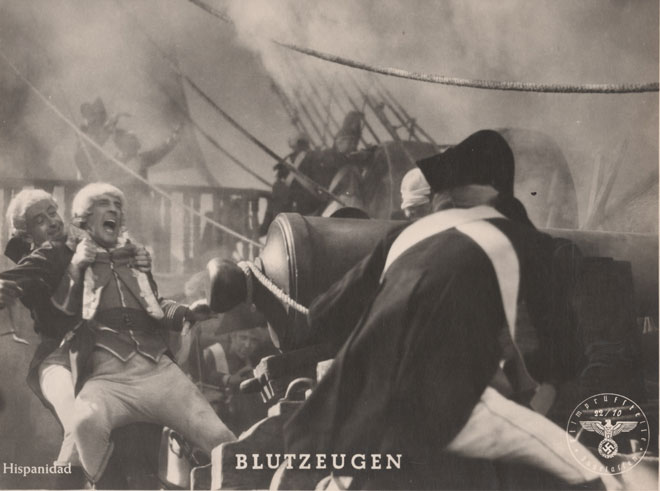
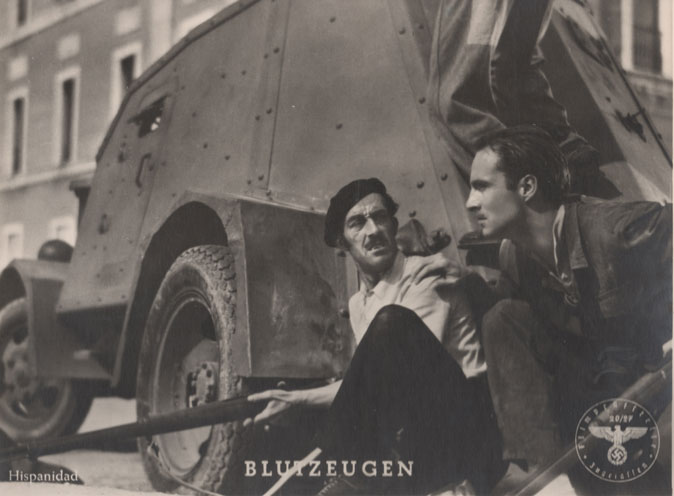
Two original Spanish press photos from our Collection:
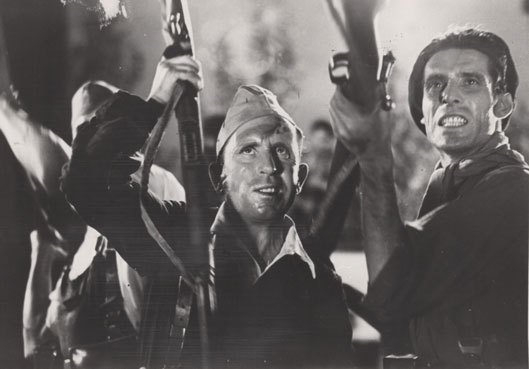
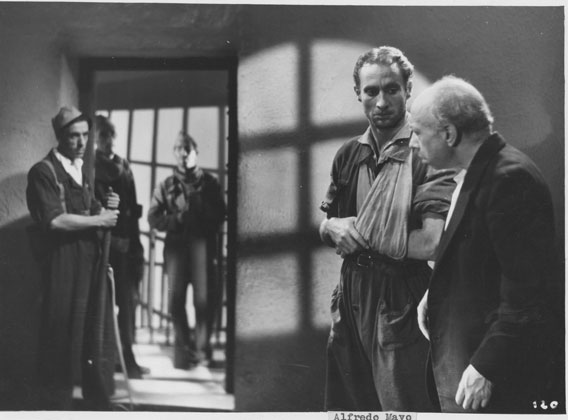
Our German film poster (Size DIN A0), which may be the only surviving poster, as no other film archive seems to have a copy.
